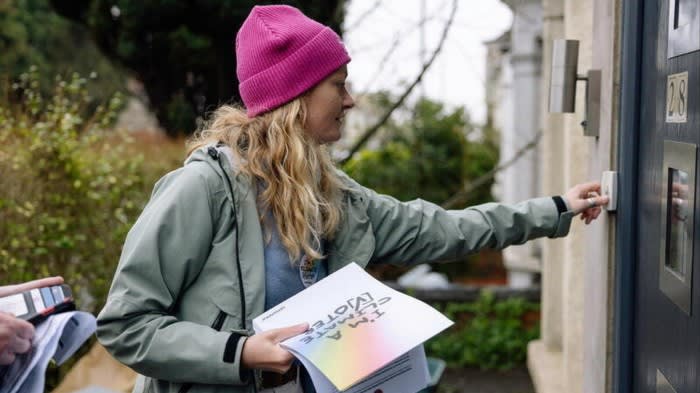In a Quaker meeting house north of London, a Greenpeace campaigner instructs a dozen volunteers. “We need to show that there are votes to be won and lost on climate,” she says. “You’ve given £3 a month for five years, you’ve signed a few petitions. We’re saying there’s more to it than that.”
Since last summer, the group has been trialling “Project Climate Vote” in a break from previous tactics, such as disrupting fuel depots or lobbying politicians.
The new strategy involves training more than 2,000 supporters to go door to door canvassing. So far, they have visited more than 42,000 households. The aim is not to push a political party — as a charity, Greenpeace is legally prevented from doing so — but to make climate into an electoral issue.
In Britain, the main problem for environmentalists is not that the public disagrees with climate action, but that they have other priorities. Climate remains behind inflation, the economy, healthcare and immigration in voters’ minds, the polls show.
That may be why climate action has been largely absent from the election campaign — even though there is a clear choice.
Rishi Sunak, the Conservative prime minister, has granted new oil and gas licences and slowed the phaseout of petrol cars and gas boilers. In the first leaders TV debate, he emphasised “energy security” and warned Labour’s climate measures could cost voters “thousands of pounds”.
In contrast, Labour leader Sir Keir Starmer said the transition away from fossil fuels was “a huge opportunity”, because “renewables are cheaper”. The Liberal Democrats, the Greens and the Scottish National party also have crafted climate action plans.
This is in line with public opinion: two-thirds of Britons say they are worried about climate change, and nearly as many say the government is not doing enough, according to a YouGov poll from March.
Contrary to public perception, older voters are as likely, and perhaps more likely, than young voters to say they are worried about climate.
Recent voting trends also show support for politicians with green policies: Sadiq Khan was re-elected as London mayor, defeating opponents of his clean air agenda, and Ben Houchen, a Conservative supporter of net zero, was reelected as mayor of the Tees Valley.
Britain’s electoral system has limited the influence of the Greens, although the party gained council seats in May’s local election. Dale Vince, a prominent green businessman, has given £5mn to Labour, warning that voting Green is a mistake because only Labour can win nationally.

The Greens do hope to win as many as four parliamentary seats in July; their only current MP, Caroline Lucas, who is not standing this time, says they can influence a future Labour government: “We know that we can shame Labour into being bolder and better.”
But it is not just the electoral system holding back the Green vote. A focus group of voters in Redcar, a “red wall” seat now held by the Conservatives, highlighted voters’ doubts about climate action. “It doesn’t matter [what a candidate pledges] because nobody delivers,” said Stephen, a former construction worker.
Geraldine, an artist who views climate change as “dangerous”, added that Britain’s policies would only have a “tiny” contribution to stopping climate change.
Luke Tryl, UK director of More in Common, which ran the focus group, said: “What was surprising is that [the participants] were so fatalistic about climate — and that tied to their lack of faith in politics.”
Some voters still remember how the UK government pushed the adoption of diesel cars, only to U-turn when their poor environmental performance was exposed, he says. “The worst thing you can do is march people up the hill.”
At the same time, the Redcar focus group showed that “there was no great culture war about wind and solar: it was why aren’t we putting them on all new-build [homes]?”
Climate action is best framed in terms of its local and national benefits, not “as part of a global endeavour”, says Tryl.
Polling for the Conservative Environment Group, a green lobby group, suggests that Sunak’s arguments on net zero are unlikely to win over right-wing voters, who are more concerned about immigration.
Even so, to answer concerns about energy security, Greenpeace trains its door-knockers to point out that climate action means “warm homes, cheap transport and green spaces”.
On that recent Saturday afternoon, its volunteers were targeting the swing seat of Welwyn Hatfield, held by the Conservative defence secretary Grant Shapps. Shapps, who as energy secretary approved a climate plan subsequently ruled “irrational” by a court, is expected to lose his seat to Labour.

One Tesla-owning couple happily pinned one of the rainbow-coloured “I’m a Climate Voter” posters in their front window. Another man took a poster for his daughter. A third said climate was not his priority but agreed he would not vote for anyone without a credible climate plan. One woman took a poster, on the basis she could snip the Greenpeace logo off the bottom.
Out of the nearly 200 doors knocked on one day, 31 people pledged to be “climate voters”. In total, Greenpeace says nearly 200,000 people have signed up online and in person — short of its target of 1 million. It has been active in 404 constituencies, or two-thirds of the total.
Campaigners say they are breaking down the idea that there is a large rump of voters who oppose climate action. “If you only view climate through a media lens, you get the impression it’s 50/50,” says Amy Cameron, programme director at Greenpeace. “When you’re on the doorstep that’s not the case.”
Climate Capital

Where climate change meets business, markets and politics. Explore the FT’s coverage here.
Are you curious about the FT’s environmental sustainability commitments? Find out more about our science-based targets here


